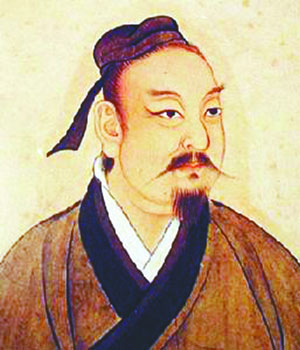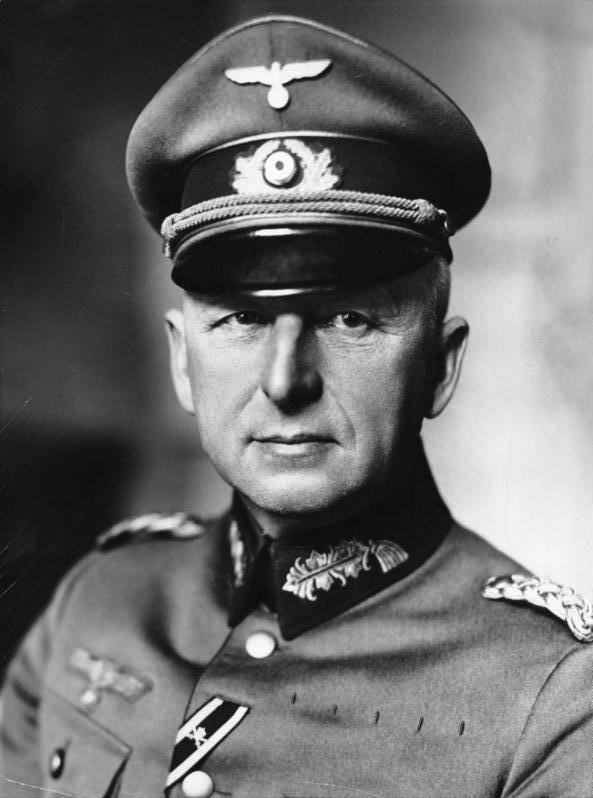|
|
Post by Laurent de Gouvion on Aug 9, 2016 14:27:39 GMT
I will do a lecture on Indonesian independence this week. Do note that the lectures are "on this day" lectures. 9 August 1945On this day, the Indonesian leaders Soekarno, Hatta, and Radjiman Wedyodiningrat was invited by Field Marshal Hisaichi Terauchi to Da Lat, Vietnam. Terauchi assured Japan would not interfere with Indonesian independence. 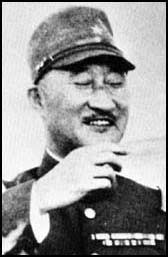 Terauchi Terauchi
BackgroundOn 7 September 1944, to garner Indonesian support in face of a losing Pacific War, Prime Minister Kuniaki Koiso promised Indonesian independence. To this end, BPUPKI (Badan Penyelidik Usaha Persiapan Kemerdekaan Indonesia) was formed on 1 March 1945. Radjiman Wedyodiningrat was the chairman.   Left: Wedyodiningrat Right: Koiso
Piagam Djakarta/The Jakarta CharterIn BPUPKI's first plenary hearing, three different ideas for the priciple of Indonesia were given. One by Mohammad Yamin, one by Soepomo, and one by Soekarno. Yamin was a supporter of human rights and wanted it in the principle. Soepomo was a fascist who admired Nazi Germany and Imperial Japan. Soekarno was a nationalist. Soekarno coined the term Pancasila, panca meaning five and sila meaning priciple in Sanskrit. 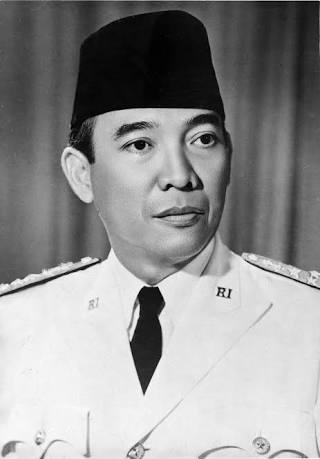 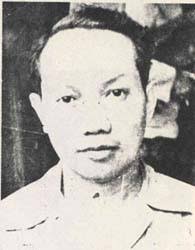 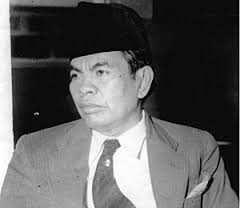 Top: Soekarno Bottom left: Soepomo Bottom right: Yamin To this end, Panitia Sembilan was formed. It consisted of Soekarno, Mohammad Hatta, Yamin, Achmad Soebardjo, A.A. Maramis, Abdoel Kahar Moezakir, Abikoesono Tjokrosoejoso, Agus Salim, and Wahid Hasjim. They made the Jakarta Charter, the foundation of Pancasila and UUD 1945 (Indonesia's constitution). The Jakarta Charter's text is: "Bahwa sesoenggoehnja kemerdekaan itoe ialah hak segala bangsa, dan oleh sebab itu maka pendjadjahan di atas doenia haroes dihapoeskan, karena tidak sesoeai dengan peri-kemanoesiaan dan peri-keadilan. Dan perdjoeangan pergerakan Kemerdekaan Indonesia telah sampailah kepada saat jang berbahagia dengan selamat sentosa mengantarkan Rakjat Indonesia ke-depan pintoe-gerbang Negara Indonesia, jang merdeka, bersatoe, berdaoelat, adil dan makmoer. Atas berkat Rahmat Allah Jang Maha Koeasa, dan dengan didorongkan oleh keinginan jang loehoer, soepaja berkehidoepan kebangsaan jang bebas, maka Rakjat Indonesia dengan ini menjatakan kemerdekaannja. Kemudian daripada itoe, oentoek membentoek soeatoe Pemerintah Negara Indonesia jang melindoengi segenap Bangsa Indonesia dan seloeroeh toempah darah Indonesia, dan untuk memadjoekan kesedjahteraan oemoem, mentjerdaskan kehidoepan bangsa, dan ikoet melaksanakan ketertiban doenia jang berdasarkan kemerdekaan, perdamaian abadi dan keadilan sosial, maka disoesoenlah kemerdekaan Kebangsaan Indonesia itoe dalam suatu Hoekoem Dasar Negara Indonesia, jang terbentoek dalam suatu susunan negara Repoeblik Indonesia jang berkedaoelatan Rakjat, dengan berdasar kepada: Ketoehanan, dengan kewadjiban mendjalankan sjari'at Islam bagi pemeloek2-nja Kemanoesiaan jang adil dan beradab Persatoean Indonesia Kerakjatan jang dipimpin oleh hikmat, kebidjaksanaan dalam permoesjarawaratan/perwakilan Keadilan sosial bagi seloeroeh Rakjat Indonesia. Djakarta, 22-6-1945 Panitia Sembilan Ir. Soekarno Mohammad Hatta Sir A.A. Maramis Abikoesno Tjokrosoejoso Abdul Kahar Muzakir H. Agus Salim Sir Achmad Subardjo Wahid Hasyim Sir Muhammad Yamin." It is now the preamble to Indonesia's constitution. The Islam part was later removed due to the diverse religous background of Indonesia.
The role of BPUPKI ended when PPKI (Panitia Persiapan Kemerdekaan Indonesia) was formed on 7 August 1945, its role to prepare the transfer of Indonesia's independence. |
|
|
|
Post by Ivan Kolev on Aug 10, 2016 0:51:14 GMT
I will do a lecture on Indonesian independence this week. Do note that the lectures are "on this day" lectures. 9 August 1945On this day, the Indonesian leaders Soekarno, Hatta, and Radjiman Wedyodiningrat was invited by Field Marshal Hisaichi Terauchi to Da Lat, Vietnam. Terauchi assured Japan would not interfere with Indonesian independence.  Terauchi Terauchi
BackgroundOn 7 September 1944, to garner Indonesian support in face of a losing Pacific War, Prime Minister Kuniaki Koiso promised Indonesian independence. To this end, BPUPKI (Badan Penyelidik Usaha Persiapan Kemerdekaan Indonesia) was formed on 1 March 1945. Radjiman Wedyodiningrat was the chairman.   Left: Wedyodiningrat Right: Koiso
Piagam Djakarta/The Jakarta CharterIn BPUPKI's first plenary hearing, three different ideas for the priciple of Indonesia were given. One by Mohammad Yamin, one by Soepomo, and one by Soekarno. Yamin was a supporter of human rights and wanted it in the principle. Soepomo was a fascist who admired Nazi Germany and Imperial Japan. Soekarno was a nationalist. Soekarno coined the term Pancasila, panca meaning five and sila meaning priciple in Sanskrit.    Top: Soekarno Bottom left: Soepomo Bottom right: Yamin To this end, Panitia Sembilan was formed. It consisted of Soekarno, Mohammad Hatta, Yamin, Achmad Soebardjo, A.A. Maramis, Abdoel Kahar Moezakir, Abikoesono Tjokrosoejoso, Agus Salim, and Wahid Hasjim. They made the Jakarta Charter, the foundation of Pancasila and UUD 1945 (Indonesia's constitution). The Jakarta Charter's text is: "Bahwa sesoenggoehnja kemerdekaan itoe ialah hak segala bangsa, dan oleh sebab itu maka pendjadjahan di atas doenia haroes dihapoeskan, karena tidak sesoeai dengan peri-kemanoesiaan dan peri-keadilan. Dan perdjoeangan pergerakan Kemerdekaan Indonesia telah sampailah kepada saat jang berbahagia dengan selamat sentosa mengantarkan Rakjat Indonesia ke-depan pintoe-gerbang Negara Indonesia, jang merdeka, bersatoe, berdaoelat, adil dan makmoer. Atas berkat Rahmat Allah Jang Maha Koeasa, dan dengan didorongkan oleh keinginan jang loehoer, soepaja berkehidoepan kebangsaan jang bebas, maka Rakjat Indonesia dengan ini menjatakan kemerdekaannja. Kemudian daripada itoe, oentoek membentoek soeatoe Pemerintah Negara Indonesia jang melindoengi segenap Bangsa Indonesia dan seloeroeh toempah darah Indonesia, dan untuk memadjoekan kesedjahteraan oemoem, mentjerdaskan kehidoepan bangsa, dan ikoet melaksanakan ketertiban doenia jang berdasarkan kemerdekaan, perdamaian abadi dan keadilan sosial, maka disoesoenlah kemerdekaan Kebangsaan Indonesia itoe dalam suatu Hoekoem Dasar Negara Indonesia, jang terbentoek dalam suatu susunan negara Repoeblik Indonesia jang berkedaoelatan Rakjat, dengan berdasar kepada: Ketoehanan, dengan kewadjiban mendjalankan sjari'at Islam bagi pemeloek2-nja Kemanoesiaan jang adil dan beradab Persatoean Indonesia Kerakjatan jang dipimpin oleh hikmat, kebidjaksanaan dalam permoesjarawaratan/perwakilan Keadilan sosial bagi seloeroeh Rakjat Indonesia. Djakarta, 22-6-1945 Panitia Sembilan Ir. Soekarno Mohammad Hatta Sir A.A. Maramis Abikoesno Tjokrosoejoso Abdul Kahar Muzakir H. Agus Salim Sir Achmad Subardjo Wahid Hasyim Sir Muhammad Yamin." It is now the preamble to Indonesia's constitution. The Islam part was later removed due to the diverse religous background of Indonesia.
The role of BPUPKI ended when PPKI (Panitia Persiapan Kemerdekaan Indonesia) was formed on 7 August 1945, its role to prepare the transfer of Indonesia's independence. Incredibly interesting, I am guessing you shall also be talking about the Indonesian War of Independence? Looking forward to that if you are |
|
|
|
Post by Laurent de Gouvion on Aug 10, 2016 11:48:48 GMT
Incredibly interesting, I am guessing you shall also be talking about the Indonesian War of Independence? Looking forward to that if you are Not yet. That's for another lecture. This mainly focuses on the events leading up to independence and the background. |
|
|
|
Post by Laurent de Gouvion on Aug 10, 2016 13:51:14 GMT
10 August 1945Today 71 years ago, after the bombings of Hiroshima and Nagaski alongside with the Soviet Invasion, Japan sends a telegram to the Allies accepting the Potsdam Declaration, but still keeping the form of government. Soekarno, Hatta, and Wedyodiningrat still hasn't returned from Da Lat. 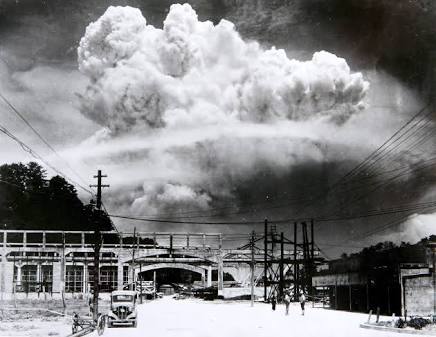 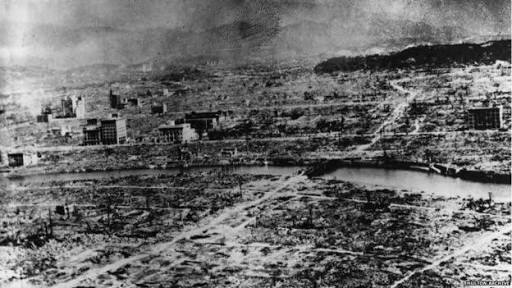 Top: Nagasaki mushroom cloud. Top: Nagasaki mushroom cloud.
Bottom: Aftermath of the bombings
Background- Imperial Japanese Occupation of IndonesiaOn 8 March 1942, after invasions and heavy losses (most of Java were evacuated or taken by Imperial Japan, the war at sea was lost), Lieutenant-General Hein ter Poorten surrendered the Dutch East Indies. Thus began the 3 year, 5 month, 9 day Japanese occupation of Indonesia in Kalidjati. 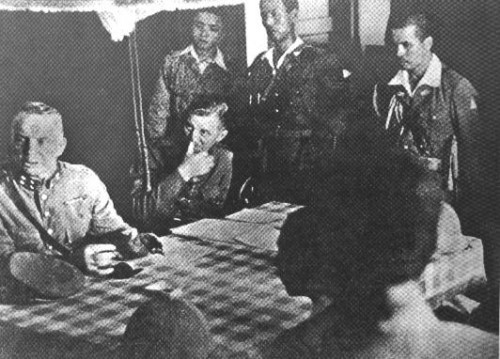 Ter Poorten's surrender Ter Poorten's surrender
Japanese Organizations and Attempts at Propaganda
At first the changing of power was met with fanfare, since more than three centuries of Dutch Colonial occupation happened in Indonesia. The Japanese established a propaganda campaign, the 3A: 1. Nippon pemimpin Asia (Japan the leader of Asia) 2. Nippon pelindoeng Asia (Japan the protector of Asia) 3. Nippon tjahaja Asia (Japan the light of Asia) 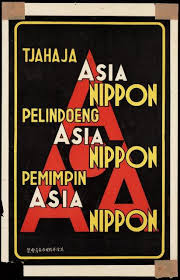 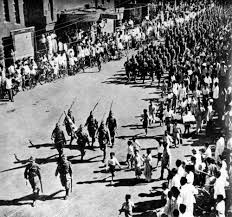 Left: 3A propaganda poster. Left: 3A propaganda poster.
Right: Japanese troops parading in JakartaHowever, 3A failed and it was soon replaced by Poetra (Poesat Tenaga Rakyat). It was later replaced by Jawa Hokokai. Japan also permitted raising of the Indonesian flag alongside the Hinomaru (Japanese flag), Indonesia Raya (Indonesian national anthem) alongside with Japan's, Kimigayo. Most importantly, they let Indonesian as a daily language. A force called PETA (Pembela Tanah Air, not the radical vegan organization) was created as means to create a huge pool of soldiers for defense. This provided military training that would later prove valuable in later wars. Figures like Soedirman, Soeharto, and Ahmad Yani were trained as PETA soldiers. However it was soon disbanded after a rebellion at Blitar. 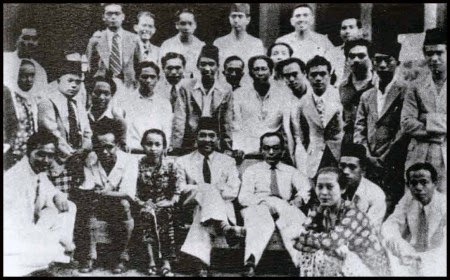 
Top: Poetra leadership
Bottom: PETA soldiers training
The Romusha and Rebellions
The Romusha were forced labor for the Japanese war effort. It is estimated that 4 to 10 million people participated as laborers. They had a higher casualty rate than Allied POWs. Romushas built many things, including most PETA facilities and the Pekanbaru Railway. There were many rebellions during the occupation and I will discuss some briefly. The Cot Plieng rebellion in 1942 were on of the earliest rebellions, led by Tengku Abdul Jalil, a young cleric. They stood at a mosque and was only driven out after three attacks. The Singaparna rebellion under Zainal Mustafa, another cleric in West Java who opposed the policy of seikerei(bowing to Tokyo/the rising sun). The rebellion lasted 1943-1944 and was stoked after a fierce battle at 25 February 1944. The largest rebellion in Java was the Blitar PETA rebellion in 1945, led by Supriyadi. They were opposed to the using of PETA as a force for the romusha policy and rice levies. Due to training, the rebellion was hard to deal with but was eventually stoked after a faked peace negotiation. 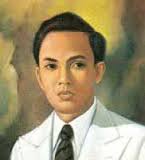 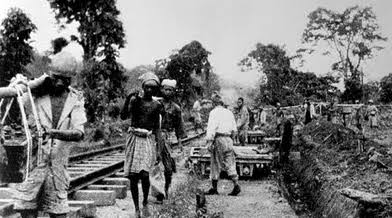 Left:Supriyadi Left:Supriyadi
Right: Romusha |
|
|
|
Post by Laurent de Gouvion on Aug 11, 2016 10:54:19 GMT
The Jakarta Charter in Modern Indonesian : Bahwa sesungguhnya kemerdekaan itu ialah hak segala bangsa, dan oleh sebab itu maka penjajahan di atas dunia harus dihapuskan, karena tidak sesuai dengan peri kemanusiaan dan peri keadilan. Dan perjuangan pergerakan Kemerdekaan Indonesia telah sampailah kepada saat yang berbahagia dengan selamat sentosa mengantarkan Rakyat Indonesia ke depan pintu gerbang Negara Indonesia, yang merdeka, bersatu, berdaulat, adil, dan makmur. Atas berkat Rahmat Allah Yang Maha Kuasa, dan dengan didorongkan oleh keinginan yang luhur, supaya berkehidupan kebangsaan yang bebas, maka Rakyat Indonesia dengan ini menyatakan kemerdekaannya. Kemudian daripada itu, untuk membentuk suatu Pemerintah Negara Indonesia yang melindungi segenap Bangsa Indonesia dan seluruh tumpah darah Indonesia, dan untuk memajukan kesejahteraan umum, mencerdaskan kehidupan bangsa, dan ikut melaksanakan ketertiban dunia yang berdasarkan kemerdekaan, perdamaian abadi dan keadilan sosial, maka disusunlah kemerdekaan Kebangsaan Indonesia itu dalam suatu Hukum Dasar Negara Indonesia, yang terbentuk dalam suatu susunan negara Republik Indonesia yang berkedaulatan Rakyat, dengan berdasar kepada: Ketuhanan, dengan kewajiban menjalankan sjari'at Islam bagi pemeluk-pemeluknya Kemanusiaan yang adil dan beradab Persatuan Indonesia Kerakyatan yang dipimpin oleh hikmat, kebijaksanaan dalam permusyarawaratan/perwakilan Keadilan sosial bagi seluruh Rakyat Indonesia. Btw, will you continue on the Rengasdengklok Kidnappings and the Proclamation? I look forward to that. It's by date. So today would be about the Allied reply and some background (Battle of Java Sea, stuff about the Imperial Japanese invasion, etc.) |
|
|
|
Post by Laurent de Gouvion on Aug 14, 2016 12:08:20 GMT
Night, 14 August 1945The Japanese cabinet decides on surrender. The surrender is transmitted through their Swiss and Swedish embassies. A military coup happens under the leadership of Major Kenji Hatanaka. The coup fails, the perpetrators committing suicide. The official surrender would be signed aboard the USS Missouri in September 2. 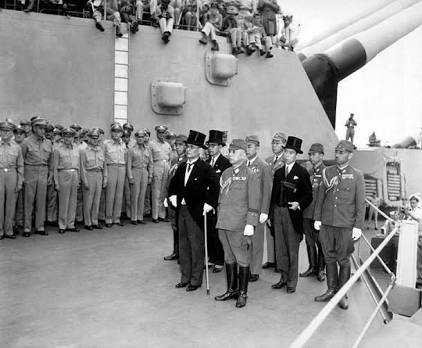 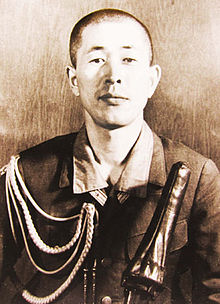 Left: USS Missouri surrender Left: USS Missouri surrender
Right: HatanakaSoekarno, Hatta, and Wedyodiningrat return from Da Lat. The 3 days would prove critical to the independence of Indonesia.
A Different Kind of SurrenderThe background lecture will discuss about the Japanese invasion and Hein ter Poorten's surrender. On 8 December 1941, the Netherlands declared war on Japan. The army in the Dutch East Indies was commanded by Hein ter Poorten, an experienced soldier. The first Japanese landing was on 17 December. After a few battles, Kalimantan had fallen. The allies on 15 January 1942 made the ABDACOM, or the American-British-Dutch-Australian Command. It was commanded by Sir Archibald Wavell. USN Admiral Thomas C. Hart was naval commander, while ter Poorten was the ground forces commander. 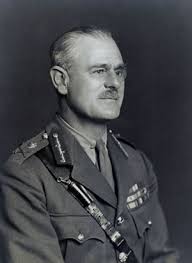 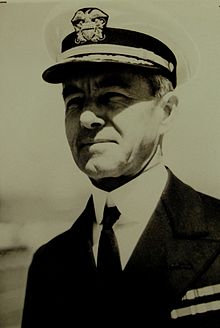 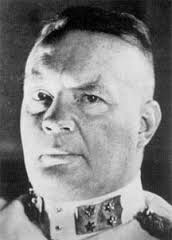 Top: Wavell Top: Wavell
Bottom left: Hart
Bottom right: ter PoortenThe ABDACOM had some success, sinking Japanese transports in the Battle of Balikpapan. On 16 February, Hart was relieved of his position as naval commander. The Allied fleet were destroyed in the Battles of Java Sea and the Battle of Sunda Strait. Among notable losses were the USS Houston and the HMS Exeter. Exeter had fought Graf Spee in the River Plate earlier. The ABDACOM was dissolved in 1 March. Wavell had resigned in 25 February. After facing losing battles in Java, ter Poorten surrendered in 8 March 1942. In general, the allies suffered loss except at Timor, where a succesful Australian-led guerilla campaign was conducted. The Japanese suffered 4,000 casualties while the Allies suffered 456, nearly a tenth. 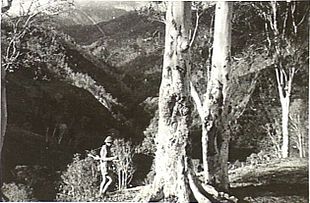 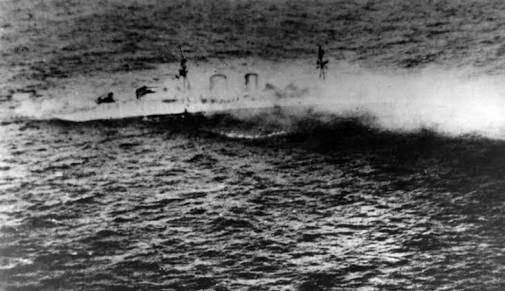  Top: Australian commando in Timor Top: Australian commando in Timor
Bottom left: Exeter sinking in Second Battle of Java Sea
Bottom right: ter Poorten's POW card.
|
|
|
|
Post by António Salazar on Aug 14, 2016 12:23:42 GMT
For so far politically accepted  Be careful though, there are a lot of Dutch on the forum, including me. |
|
|
|
Post by Ivan Kolev on Aug 14, 2016 12:35:49 GMT
For so far politically accepted  Be careful though, there are a lot of Dutch on the forum, including me. He isn't anti-Dutch, dont worry  . Im sure it will be like an American talking about the American Revolution. |
|
|
|
Post by António Salazar on Aug 14, 2016 12:57:27 GMT
For so far politically accepted  Be careful though, there are a lot of Dutch on the forum, including me. He isn't anti-Dutch, dont worry  . Im sure it will be like an American talking about the American Revolution. Well maybe not. Just to point out: I am not a supporter of the 'politionele acties' nor a supporter of the the independence war. However I do support both the independence of Indonesia as the Maluku Islands. That being said, nice lecture  |
|
|
|
Post by Ivan Kolev on Aug 14, 2016 13:12:29 GMT
He isn't anti-Dutch, dont worry  . Im sure it will be like an American talking about the American Revolution. Well maybe not. Just to point out: I am not a supporter of the 'politionele acties' nor a supporter of the the independence war. However I do support both the independence of Indonesia as the Maluku Islands. That being said, nice lecture  Well I'm just saying that its either going to be like a Vietnamese person talking about the independence war against the French or like an American talking about the American Revolution. Either way, they're not going to slam the nation as it is today unless they're just really rude. But yes, great lecture, this stuff is really interesting. |
|
|
|
Post by Laurent de Gouvion on Aug 15, 2016 12:51:53 GMT
15 August 1945Sutan Sjahrir, an Indonesian patriot, hears of the Japanese surrender through BBC. Hirohito had originally broadcasted in NHK. Sjahrir goes to inform Soekarno and Hatta about the developments. A debate rages between Golongan Pemuda (young activists who disliked cooperation with Imperial Japan) and Golongan Tua (senior activists who had been main figureheads of Japanese occupation). While the Pemuda wanted independence ASAP, Golongan Tua wanted a PPKI meeting as to avoid bloodshed. Soekarno and Hatta check the military chief office. The office turns out to be empty. They go to the office of Rear Admiral Tadashi Maeda. Maeda had not received offical orders and as such advises the activists to stand down. At night, the Pemuda hold a meeting in Jalan Pegangsaan Timur. They implore Soekarno to cut ties with Japan. He refuses.  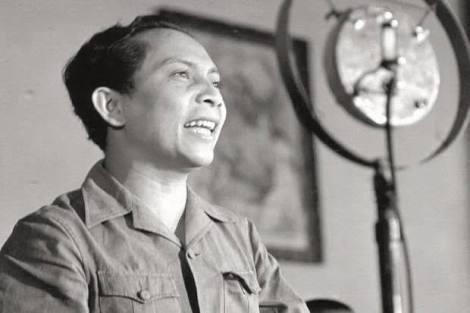 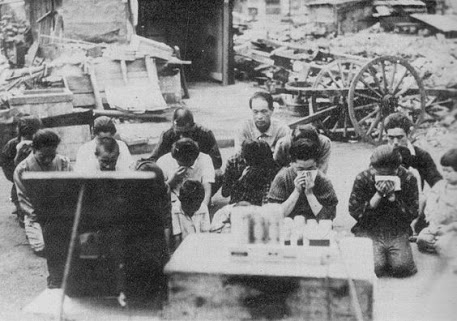 Top: Maeda Top: Maeda
Middle: Sjahrir
Bottom: Japanese people hearing the surrender broadcast
|
|
|
|
Post by Laurent de Gouvion on Aug 16, 2016 13:52:35 GMT
16 August 1945Some Pemuda, most notably Soekarni, Chaerul Saleh, and Wikana kidnaps Soekarno and Hatta. They also kidnap Fatmawati and Guntur, the former being Soekarno's wife and the latter being hus child. This occured at 03.00 WIB (WIB: GMT+7). They take Soekarno and Hatta to Rengasdenglok, Karawang. The Pemuda does this to push Soekarno into a quicker proclamation of independence. They also want as little Japanese influence as possible by isolating themselves. Achmad Soebardjo resolves the differences between Golongan Pemuda and Golongan Tua in Jakarta. Parts of the Pemuda under Chaerul Saleh plan an insurrection there but is unsupported by PETA. In Rengasdenglok, the Indonesian flag has already been raised. Jusuf Kunto takes Soebardjo to Rengasdenglok. They take Soekarno and others back to Jakarta. They arrive at night. Major General Otoshi Nishimura states that the status quo must be kept, contrary to Terauchi's promises in Da Lat. Soekarno takes a jab at Nishimura, stating that such action violates the Bushido. They then go to Rear Admiral Tadachi Maeda's house. 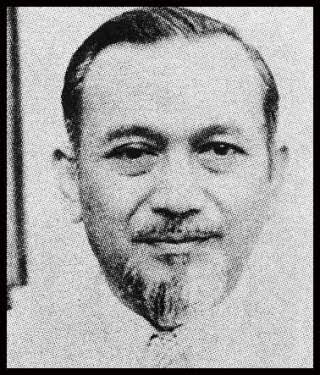 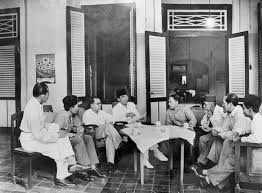 Left: Soebardjo Left: Soebardjo
Right: Discussion at Rengasdenglok
|
|
|
|
Post by The Battener on Aug 16, 2016 18:17:19 GMT
The 71st Celebration of Indonesian Independence Day! Yay(?) The Indonesian Proclamation of Independence is proclaimed at 10:00 GMT+7 though  |
|
|
|
Post by NetherFreek on Aug 16, 2016 18:26:06 GMT
The 71st Celebration of Indonesian Independence Day! Yay(?) The Indonesian Proclamation of Independence is proclaimed at 10:00 GMT+7 though  Congrats |
|
|
|
Post by The Battener on Aug 16, 2016 18:30:41 GMT
The 71st Celebration of Indonesian Independence Day! Yay(?) The Indonesian Proclamation of Independence is proclaimed at 10:00 GMT+7 though  Congrats Thanks!  Though to be honest, I'm not that nationalist. I'm more with the belief that you don't choose where you are born so being overly nationalist is not me. Besides, I can't say I'm pure Indonesian since one of my great grandfather was half Dutch and another one of my great grandfather was Chinese... So yeah. |
|

































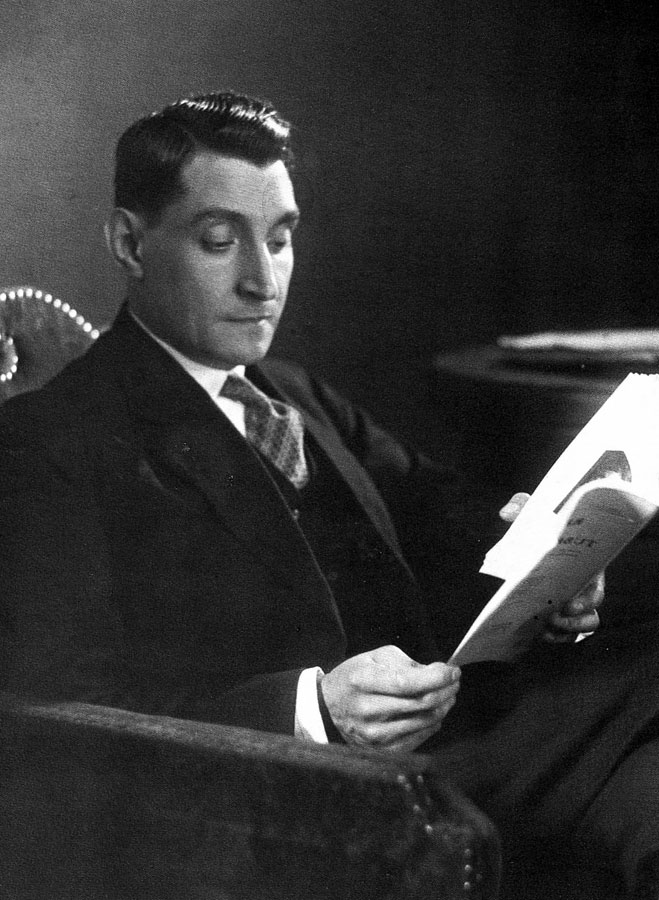

 . Im sure it will be like an American talking about the American Revolution.
. Im sure it will be like an American talking about the American Revolution.







